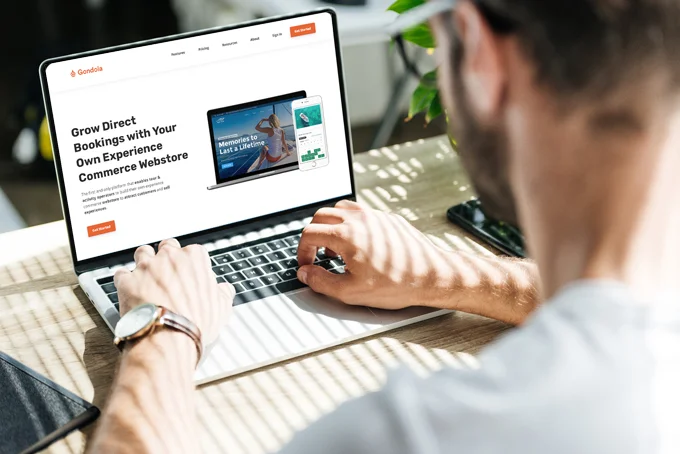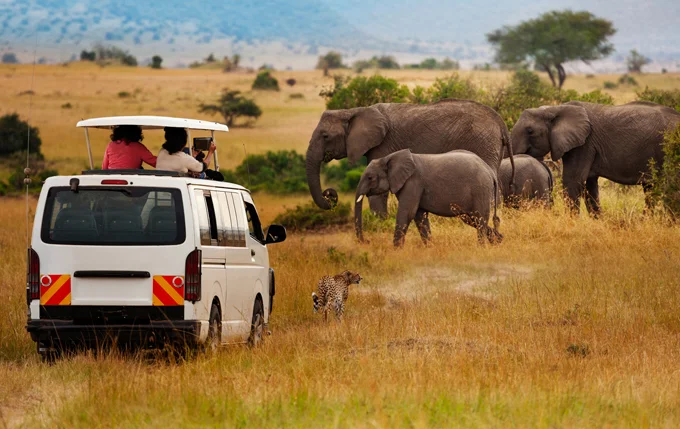How To Start A Tour Company: Essential Guide

In this guide of how to start a tour company, we’ve included some actionable tips for each section so you can start creating your profitable business.
The Overview Of The Tour Operator Industry
The travel industry is a large and growing field. The World Tourism Organization (WTO) defines tourism as the social, economic, and political activities of persons traveling to and staying in places outside their usual environment for not more than one year for leisure, business, and other purposes. It is a crucial industry to the economy. Tourism accounts for around 10% of global GDP ($7 trillion), directly employs 1 in 9 people globally and provides over 260 million jobs. Here is how to start a tour company.
1) Market Research
You’ve got to know your market. Doing target market research is a crucial step in starting up, and it can help you understand the tourism industry and your competitors.
While many people think that they are the only persons who have ever thought of starting their own tour company, and so they have no competition, that’s not the case. There are hundreds, if not thousands, of people who had thought of starting their own tour company before you did, and there will be even more after you do so.
Target market research is vital because it can help you make informed decisions about how to proceed with your tour operator business. Also, the research helps you avoid mistakes that could lead to failure. These include being blindsided by things like an influx of new competition or unexpected changes within the travel industry. Research saves time and money as things can go awry later due to the lack of proper preparation beforehand.

2) Research Your Competitors
The first step to starting a tour company is understanding what competitors are doing, and the tour idea they prefer. Look at their websites, social media accounts, and reviews. Find out what tours they offer, where they operate, and how much it costs to join in on the trip.
You can also ask around town or online if anyone has had a good experience with these companies. This will help you build up an idea of who’s good at what they do, and their areas of weakness.
Once you have done this research on your competitors, it’s time to start thinking about ways in which you could stand out from them. Ask yourself questions, such as what unique qualities set your tour operator business apart from other tour operators? Could there be gaps in the target market where no tour operator has yet stepped in?

3) Name Your Tour Business
As a tour operator, when choosing a name for your company, make sure it’s easy to spell and pronounce so that you get your first tour faster. You don’t want people to have trouble with it or think they’ve heard of you before when they haven’t.
Such mistakes can make it hard for you when selling tours. Also, pay attention to how long the name is. It should be short enough that people can remember it easily but long enough so that its meaning doesn’t get lost in translation.
An excellent way to come up with names is by combining words like “sun” and “beach.” Or try using your name as part of the tour guide business name, like Jane’s Tours. If none of those ideas work for you, then choose something else.
Finally, ensure that no one else has used this exact combination of words as their business name. If someone has registered an identical trademark, then chances are they’ll sue you if they find out about yours immediately or in the future.

4) Choose a business structure
- Sole proprietorship: This structure is easiest to set up because it requires the least amount of paperwork, but you don’t get any tax benefits or protection. The business and its owners are the same people, so if something goes wrong with your tour operator business, there’s no insurance policy or other safety programs to help protect you against financial loss.
- Partnership: Partnerships are similar to sole proprietorships in many ways. They’re also easy to set up, but give some liability protection to partners who invest money into the tour business, for example, if one partner dies, goes insane, or opts out of the tour business. The partnership agreement should include details about how much each partner contributes financially and what happens if someone wants out of their investment early on. This will help keep everyone happy during difficult times.
- Corporations: Corporations offer even more protection than partnerships because shareholders have limited liability, which means if something goes wrong with the company due to negligence from management etc., then most creditors cannot sue shareholders personally. This helps keep them safe from losing everything overnight if a risk occurs.

5) Register Your Business
The next step is registering your tour business with the state and federal governments. You’ll need to do this to get a tax ID number, which you can use for things like getting a business bank account and paying taxes. For this purpose, you’ll also want to register your company with the IRS and each local agency that governs businesses in your area.
The city, county, state tax commission, and chamber of commerce require you to submit paperwork for their purposes, and they all have different requirements for how often these forms must be submitted, and whether or not they’re free.
If you’re starting a tour company in New York City, for instance, then there are several groups that you need to share your details with.
The New York City Department of Consumer Affairs (DCA) will ask for your tour operator business name, contact information, and address. The DCA also requires that you submit a copy of your business license from each state where it operates tours.

6) Finance Your Business
Your first step will be to finance your tour business. You will need to cover the costs of marketing, training, equipment, and more. In addition, you will need to pay for insurance, other operating costs, and any travel expenses you incur.
It would be best if you planned on having at least $20,000 available in savings or other investments upon starting your tour company. This is the bare minimum amount of capital most banks require when applying for a business loan. You don’t have to save that much if you don’t intend to apply for a loan in the near future.
If this seems like too much money to save up, but you need financial support to start your company, then consider getting a personal credit line from your bank instead. That way, you’ll still have access to financing but won’t have to wait until after being approved for an actual loan before being able to begin operations.
You’ll also need to consider the costs of starting your tour business, such as purchasing a vehicle, office supplies, and marketing materials. In addition, you will need to pay for insurance, other operating costs, and any travel expenses you incur.

7) Find Office Space And Equipment
Once you’ve decided to start a tour company, it’s time to consider all the equipment and office space you’ll need. First, you need office space. There are various types of offices available, including those in shared spaces, which can be more affordable, or private offices that are more expensive.
Depending on the size of your company and how many people serve in the tour guide department you have, you may also need some computers and printers. In some cases, you’ll need to have phones, fax machines, and other business equipment.
It would be best if you also considered purchasing furniture such as desks or chairs for each employee and office supplies like note pads or folders so everyone can access important documents when needed.
If you’re starting a mobile tour company, you’ll need to consider the vehicles you will use and how many employees will work with you on each tour. You may want to hire a bus or van to fit all your equipment and employees comfortably.
It’s okay to begin with cheaper vehicles in the initial stages of your business.

8) Hire Employees
When hiring employees, look for people who are passionate about your tour operator business and share your vision. You want to hire people who are good at what they do and have a good work ethic.
They must also have good communication skills so it will be easier to work with them. Also, it would help if you considered hiring honest, trustworthy, reliable individuals who can help take care of all aspects of running the tour company by themselves when needed.

9) Set Up Accounting And Software Systems
Now it’s time to transition from the initial planning phase into the implementation stage. You’ve identified your customers’ needs, set up a tour business plan and budget, and selected a location for your tour company. It’s time to start building your brand. The budget can give you a rough picture of what the start up costs.
One of the most important aspects of any successful small business is accounting. If you want to ensure that everything runs smoothly in your company, make sure that you have an accounting system in place from day one.
As a tour operator, your goal should be to set up a system that will allow you to track finances easily while also giving you access to essential reports on sales and expenses so that you can see where money is being spent or earned at any given point in time.
For software systems specifically designed for travel companies, or other businesses with similar needs, look for something like QuickBooks ProAdvisor Service, which has been designed specifically with small businesses like yours in mind. It makes managing finances easy by providing real-time visibility into account balances without requiring extensive training or technical know-how from anyone who wants access.

10) Create Policies And Procedures, Handbooks, And More
Once you’ve figured out the capital you need for a tour agency, it’s time to get organized. You might be tempted to skip this step since it feels like a lot of work when you have so many other things. But if you don’t think through how your business will operate, it will be harder for employees and potential customers alike to understand how they fit into the picture.
Starting a tour business can be exciting, but it can also be overwhelming. That’s why we’re here to help you. We’ll walk you through all the steps of getting started in the industry. These include researching your competitors and market, finding office space and equipment, hiring employees, setting up accounting systems, and having a good business plan.
The easiest way to do this is by creating policies and procedures that spell out everything from how often each of your tour guide should give tours to which tasks each employee is responsible for. Once these policies are established, ensure they’re written down in an easy-to-read handbook or manual, and keep them up-to-date.
The handbook should also include information about anything that could affect your organization’s operations. These include office hours, emergency contact numbers, and even where mail should be sent if there’s no receptionist on duty. If possible, consider providing an online version as well of the manual. This way, employees can access critical information from their phones while on the go.

11) Create A Marketing Plan To Get Clients And More
If you want to start a tour agency, it will be essential for you to create a marketing plan. Marketing is the process of promoting your business to potential clients. Knowing where to start can sometimes be challenging, especially when you’re just starting.
Many tour operators understand that the good way is by creating an effective marketing business plan that helps guide your business and gives direction on how much money should be spent on advertising and other forms of promotion each month/year.
The first thing that needs to happen before creating an effective marketing business plan is figuring out where all the funds will come from so that there will be enough money left over for advertising and other promotional activities later.
This step involves calculating all costs of running a successful tour company for the best tour experience, such as monthly rent payments for office space or vehicles used during tours and any staffing expenses. Anything explicitly related to running this type of business venture.
Once the costs are calculated, it’s time to decide how much money should be spent on advertising and other forms of promotion each month/year. A good rule of thumb is that you should spend about 5% of your monthly gross income on marketing and advertising.

12) Create A Website
It’s the first thing potential customers see when they search for your business, and if you don’t have one of your own, they’ll end up on another site anyway.
If you’re starting out and don’t have the budget for a custom-built site from scratch, try using a free basic website builder. Some of these free platforms offer templates that can be customized with just a few clicks of your mouse, so even if you have zero web design skills, there’s no reason you can’t create something that looks professional and presentable in under an hour.

Challenges Of Running A Tour Company
Running a tour company can be stressful. The overhead alone is challenging to manage, and you must maintain a safe environment for your clients while still providing great service. This is made even more challenging because any problems with your tour operator business will reflect poorly on you as a person and your strong brand as an organization. Here’s what to know when running a tour company;
1) Providing A Profitable Product
Your profit margin is the most important thing to consider when pricing a tour. When pricing your services, you must remember what percentage of profit you want to make. It would help if you also looked at how much money it will cost for you and your staff, such as paying for gas or hiring tour guides.
Once you have these two factors in mind, you can easily determine how much each person gets paid per hour and calculate the overall cost of bringing someone on tour. You also need to allow online bookings for smooth flow of your business.
Then you can compare this number with other tours in your area and see if yours is priced relatively or if they’re too high or too low compared with their competitors’ prices. If other factors affect the tour pricing, such as special gear needed, those should be included when calculating costs so customers know exactly what they’re paying for before signing up.

2) Providing Customer Service
As a tour company with tour guides, providing customer service is an integral part of the job. Customers will book your trips because they want to have fun, but they’ll also choose you over your competitors because of how well you treat them.
Customer service doesn’t mean giving customers what they ask for exactly as they imagine it. It means going above and beyond their expectations in ways that keep them coming back for more. You can do this by offering unexpected perks, like free bottles of water during long hikes or free snacks on long bus rides.
As a tour operator, you could even go so far as to offer guided tours at discounted prices and give tours twice a week instead of just once. This is to ensure that if someone missed out on seeing something cool last time around, there’s still another chance. The possibilities are endless.

3) The Overhead Can Be An Issue
While the cost of being a tour operator may not be astronomical, it can still be an issue if you don’t have a business plan. For example, your staff costs will increase as your company grows. You’ll need more people to handle website maintenance, ensure social media presence, and customer service inquiries. And unless you want to work 24 hours a day, seven days a week for the rest of your life, that means hiring outside contractors during off hours or paying overtime rates when working with existing staff members.
Another significant expense is vehicle maintenance and fuel costs, especially if you’re using vans or buses rather than smaller cars or motorbikes as part of your fleet. This is where planning ahead becomes essential. Do some research online about which brands have been known to last longer in harsh climates, such as those found in Southeast Asia, before investing too much money upfront into vehicles that could break down within weeks.
This is likely due to poor construction quality issues caused by excessive heat exposure during manufacturing processes. Also, ensure they are equipped with air conditioning units because while they might seem like luxuries today, they’ll become necessities tomorrow.

Contact Us
For many years, Gondola has worked with a vast range of clients and tour operators globally. Our mission is to ensure that tour and activity companies get compelling websites. Our latest technology and innovative tools will ensure that your tour website stands out from the competition. You might want to check out our official website to understand how you can benefit from our presence.
Also, you can contact us today, and our experts will ensure that all your answers are professionally answered, including how to set up a good booking system.
Starting a tour company can be a great way to gain experience and earn money. The key is putting work into planning and preparing before you start to avoid unnecessary costs and risks. We hope this piece helps you understand how to start a tour company and steer it toward success as a tour operator.
